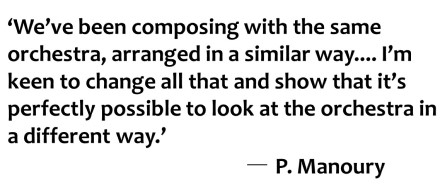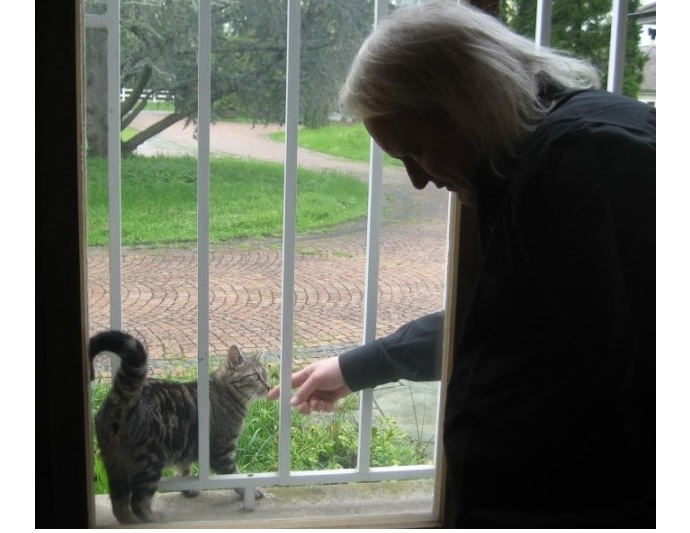Suntory Hall Summer Festival 2024
Theme Composer PHILIPPE MANOURY
Exploring New Sound Horizons
On the Visionary French Composer Philippe Manoury and His Bold Ideas for the Future of the Orchestra
The Theme Composer of the Suntory Hall Summer Festival 2024 (August 22-29) is Philippe Manoury (b.1952), who is a leading French composer as well as a researcher and pioneer in the field of electro-acoustic music. The two concerts will showcase his diverse output from ensemble works to music featuring live electronics, and orchestral works with spatial arrangement of the musicians. UK-based music critic Gavin Dixon discusses Manoury’s musical ideas and works.

‘The two media that interest me the most are large orchestras and electronics. The latter is a kind of new orchestra for me, by the way. Large orchestras offer a multitude of sources and I like this pluralism of voices. Writing for orchestras is like playing chess: the combinations are infinite even if we do know all the rules.’*
French music has always had a strong focus on colour and texture. Philippe Manoury’s work is no exception, and he continually seeks to expand the range of sounds available. He is primarily an orchestral composer, but is not bound by tradition, instead continually reinventing the orchestra to explore new possibilities offered by the acoustics of modern concert halls. He is also a pioneer of electronic music, combining electronic sounds with traditional instruments. This too leads to new sound horizons, taking both orchestral and chamber music into vibrant new worlds.

Real-time computer processing allows electronic music to play an active role in live performance, an approach that Manoury has explored throughout his career. From 1981, he worked at IRCAM, the electronic music studio in Paris led by Pierre Boulez. There, he collaborated with the mathematician Miller Puckette in developing Max/MSP, a programme designed to allow computers to interact with traditional instruments as part of the musical performance.
He initially applied electronic transformations to solo instruments and small ensembles, in works such as Jupiter for flute and live electronics (1987, revised 1992), Pluton for piano and live electronics (1988, revised 1989), and Neptune for three percussionists and live electronics (1991). From the 1990s, he more often worked with larger ensembles, and even when he was not employing electronics, computer manipulation continued to have an influence. Passacaille pour Tokyo for piano and 17 instruments (1994), for example, complements a virtuosic solo piano part with subtle combinations of instruments drawn from the ensemble, much like the additional sonic layers created with electronics in other works. Passacaille pour Tokyo was written for pianist Ichiro Nodaira, for whom Pluton had also been composed. It was commissioned by the Fondation Arion-Edo for the Tokyo Summer Festival, early in what has become a long and fruitful relationship with Japan.

The scale of Manoury’s work continued to expand through the 90s, and he has composed five operas since 1996, the most recent, Kein Licht (2017), about the Fukushima disaster. But he has also returned to smaller ensembles, and the concert on 27 August showcases some of the chamber music that Manoury has composed in recent years. Hypothèses du sextuor (2011) challenges the convention – the ‘hypothesis’– that chamber music should be a close collaboration between players. The title was inspired by a visit to Japan, where Manoury met museum curators who had recently staged an exhibition called ‘The Crystal Hypothesis’. Ensemble collaboration is treated as a hypothesis in the sense that the individual players often go off at tangents on their own, challenging the coherence of the group. Illud Etiam (2012) is a work for soprano and real-time electronics. Inspiration comes from Ingmar Bergman’s film The Seventh Seal, with its allusions to witchcraft in the Middle Ages. The soprano variously takes the roles witch and inquisitor, a drama-in-microcosm which draws on Manoury’s experiences in opera. String Quartet No. 4, an Arditti Quartet commission from 2015, also challenges conventions of chamber music. Traditional approaches to musical form are compromised through the episodic structure, acknowledged in the work’s subtitle, ‘Fragmenti’. The 11 sections each present a single idea, some drawn from Manoury’s earlier works, with only minimal interactions between them. As in Hypothèses du sextuor, the individual lines are often unsynchronised, giving the impression that the music is moving simultaneously in different directions.
Das Wohlpräparierte Klavier (...troisième sonate...) for piano and live electronics was written to a commission from Daniel Barenboim, who gave the premiere in 2021. Here, Manoury imagines the relationship between keyboard and electronics as a modern equivalent of that between counterpoint and temperament in the time of Bach. Where Bach embraced new tuning systems in order to move freely between distant tonalities, so Manoury uses electronic manipulation to lead the piano into new and unfamiliar sonic realms. The connection to Bach is acknowledged in the work’s structure, a free fantasy followed by a rigorous finale: a prelude and a fugue. Meanwhile, the electronic sounds create an aural sensation of ‘flocking’, imitating and overlaying the piano textures. The pianist becomes the leader of a flock of sounds, surrounding both player and audience.
The orchestral concert on August 23 offers broader perspectives on Manoury’s place in contemporary musical culture. He has chosen works by one predecessor and one composer of the following generation: Pierre Boulez and Francesca Verunelli. Verunelli (b. 1979) is an Italian composer who, like Manoury, has close links with IRCAM. Manoury has chosen her for her originality, artistic independence and unique soundworld. He explains, ‘She is one of those “composers who seek” to whom I feel very close.’ Boulez was another close colleague, going back to Manoury’s earliest years at IRCAM. He was a pivotal figure in 20th-century French music, a link back to French Romantic traditions as well as to post-war Modernism. Manoury remembers Boulez warmly as a friend, describing him as ‘a very cheerful yet serious man, who had this mixture of freedom and rigour with which I felt very comfortable.’ Two of Manoury’s major works, Sound and Fury (1998-99) and Portrait of the Artist as a Young Man (2005), where written to celebrate Boulez’s 75th and 80th birthdays.
Debussy also figures prominently on the programme, a reflection of Manoury’s growing realisation of his influence, especially on his approach to the orchestra. Before Debussy, Manoury explains, orchestration was hierarchical, with the strings dominating, and the winds and percussion in subservient roles. But in Debussy, ideas can appear in any instrumental family, and be associated with any colour or combination. That sense of liberated orchestral colour is the basis of Manoury’s orchestral arrangement of Debussy’s piano piece Rêve.
Another personal influence with a link to Debussy is the conductor François-Xavier Roth. Although Roth specialises in late Romantic music, usually performed on period instruments, he champions new music as well, especially Manoury’s. It was Roth who suggested to Barenboim that he commission Das Wohlpräparierte Klavier, after conducting a performance of Manoury’s music in Berlin. Manoury’s most significant collaboration with Roth has been the ‘Köln Trilogy’, a series of large-scale works, the orchestral pieces Ring (2016) and In situ (2017) and the music theatre piece Lab.Oratorium (2019). The trilogy is designed to build on Debussy’s legacy. Manoury argues that developments in concert hall design offer new opportunities for the exploration of innovative orchestral sounds, as initiated by Debussy. To achieve this, the composer varies the stage layout for each work. In Ring, a Mozart-sized orchestra is placed on the stage, while several other groups are spread around the hall. In situ goes further, distributing the entire orchestra around the audience, the players positioned at the corners of geometric shapes, laid out against the venue’s floorplan.
The Köln Trilogy exploits the new possibilities offered by the Philharmonie concert hall in Cologne. Manoury’s latest work, Présences, which will be premiered on August 23, draws on the similarly inspirational performance space of Suntory Hall. Présences will have mobile performers and flexible groupings. Manoury explains, ‘...two groups of musicians hatch out from within the orchestra, taking on an independence as they move away from it. It’s a metaphor for the present, which is constantly changing before our eyes (and ears), leaving us uncertain about the future.’
The future of orchestral music seems bright, if unpredictable, in Manoury’s hands. Important voices from the past – Debussy and Boulez – will continue to influence, but old certainties will be challenged further. In Présences, we glimpse a new future for the orchestra, guided more by its sonic potential than by history or tradition. ‘For over two centuries,’ Manoury says, ‘we’ve been composing with the same orchestra, arranged in a similar way, with the same structure, the same families, the same hierarchies. I’m keen to change all that and show that it’s perfectly possible to look at the orchestra in a different way.’
Reference:
'Pluralism of Voices'
Gavin Dixon ©2024
Gavin Dixon a writer and journalist, and Reviews Editor of Gramophone magazine. He has a PhD on the symphonies of Alfred Schnittke and is a member of the editorial team for the Alfred Schnittke Collected Works Edition. He is the author of The Routledge Handbook to the Music of Alfred Schnittke, published in 2022. He has also written CD liner notes for labels including Alto, BIS, Northern Flowers, SOMM and Sono Luminus. As a journalist, Gavin has contributed to a wide range of music publications including Gramophone, Opera, Tempo, Classical Music and Limelight.
-
Debussy (arr. Manoury) Rêve (arr. for Orchestra)
(2017, Festival Musica Strasbourg )
